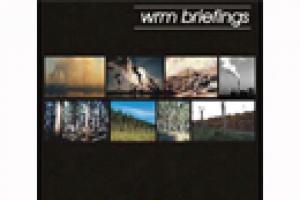What's wrong with a company pursuing a green seal for 'sustainable forest management' and a climate-friendly credit for planting trees that help soak up carbon from the atmosphere? Potentially a lot, especially when both of these claims are rather dubious, as the WRM Bulletin coverage on the Brazilian company Plantar S/A indicates. And even more problematic if a company, when faced with criticism about its carbon sinks project, resorts to such tactics as the distortion of facts to discredit its critics.
The Green Economy
The Green Economy is a tactic used to “clean up” the image of corporations rather than address corporate capture and capitalism as the true drivers of deforestation. False solutions promoted under the Green Economy include certification, sustainable forest management, ecosystem services, REDD+, the bioeconomy, nature-based climate solutions, and zero net deforestation. Rather than stopping it, these “solutions” support corporate-driven destruction that is causing a deep social and ecological crisis.
Bulletin articles
30 June 2003
There is now compelling evidence that mining severely limits a nation's ability to sustain economic growth (even within the narrow definitions usually adhered to by nation states). This is a surprising "discovery" for those who think that "riches" in the ground are unfailingly translated into money in the bank. But for those who adopt an anti-colonialist analysis of capital accumulation, the fundamental reason for the discrepancy is not hard to find. Zaire, Bolivia and Sierra Leone are not merely "poor" -they have been ruthlessly impoverished over hundreds of years.
Bulletin articles
3 May 2003
Advance Agro, one of Thailand's largest pulp and paper companies, markets its "Double A" brand paper as environmentally friendly. The company's advertising explains that the raw material comes from plantations and thus relieves pressure on remaining forest areas.
Bulletin articles
3 May 2003
A letter with over 50 signatures from Brazilian NGOs, churches, movements and trade unions was sent to investors of the World Bank's Prototype Carbon Fund (PCF) on 26 March 2003, urging them not to buy carbon credits from the controversial Plantar project in Minas Gerais, Brazil. The letter (available at www.sinkswatch.org, also see WRM Bulletin 65) states that Plantar is neither clean nor sustainable development, that the company has continuously violated labour laws, and does not possess an EIA, though required according to the law.
Other information
3 May 2003
Every time the Asian Development Bank lends money on a project it creates a problem for the government receiving the loan. The project must make money in order that the government can pay the Bank back. This sounds like straightforward economics, but when the Bank gives loans for forestry projects, this means that the forests must make a profit. The simplest way of converting forests to profits is to cut down the trees. The social and environmental impacts of doing this are often devastating.
Bulletin articles
3 April 2003
Genetic engineering is racing ahead to provide genetically tailored trees designed for commercial plantations with traits such as herbicide resistance, insecticide production, rapid growth and reduced lignin content in trees for commercial convenience.
Other information
4 March 2003
The imagination of technocrats seems to have no limits. On the other hand, their common sense appears to be extremely and increasingly impaired. Their bright ideas surprise us --backward people-- constantly and at times we even doubt --unscientifically-- about their mental sanity.
Such is the case of a Dr Klaus Lackner, a Columbia University physicist, who has invented an artificial tree which according to him is much better than the obviously limited real one.
Other information
4 March 2003
To governments and civil society committed to halting climate change and reducing fossil fuel emissions at source, the latest developments at the BioCarbon Fund must be worrying. The fund's 'two-window' approach aims at re-opening the door for carbon sink credits from conservation projects even though governments clearly excluded credits from this project type to be used by industrialised countries to achieve their emission reduction targets under the Kyoto Protocol.
Other information
11 February 2003
As governments at the 7th Conference of the Parties to the climate change convention, COP7, in Marrakesh in 2001, put the final touches on the decision that made carbon sink projects eligible for credits under the Kyoto Protocol's Clean Development Mechanism (CDM), a group of NGOs formed SinksWatch, an initiative to track and scrutinize carbon sink projects related to the Kyoto Protocol.
Publications
17 November 2002
The solution to climate change --which is already happening and being suffered by millions of people around the world-- is in theory quite simple: to substantially reduce emissions of greenhouse gases, particularly carbon dioxide. The majority of those emissions result from the use of fossil fuels (coal, oil and natural gas), whose carbon was safely stored under the earth's surface. The extraction of vast and increasing volumes of fossil fuels is at the core of the current climatic crisis.
Bulletin articles
7 November 2002
The Forest Stewardship Council will be holding its general assembly this month in Oaxaca, Mexico and we wish to share our concerns regarding the certification of plantations with FSC members, particularly from environmental and social organizations.
The WRM has been campaigning for many years against the spread of monoculture tree plantations and has documented both the interests behind their promotion and the widespread social and environmental impacts they entail.
Bulletin articles
7 November 2002
A group of seven researchers assessed the certifications of the V&M Florestal Ltda. Company (Vallourec & Mannesman), which obtained FSC certification in 1999 for its whole area of 235,886 hectares, through the certification firm SGS. They also assessed those of Plantar Reflorestamentos S.A., which obtained SCS certification for an area of 13,287 hectares. With this certification, V&M Florestal became the company with the largest certified area in Brazil.

